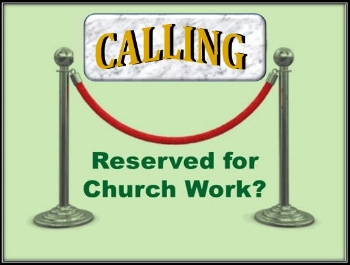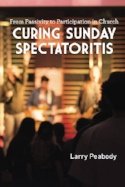Shared-Church Singing
My surprising discovery came when I looked at the lyrics of the top ten Christian songs. But the story does not begin there. It all started when the teacher/facilitator of our Sunday adult class requested that I fill in for him. On what aspect of our faith, I asked, should I help the class to focus on? Then something came to mind.
Songs to God as Creator?
Not long before that, and for another group, I had prepared a devotional on worshiping God as Creator. In John’s vision of the worship in heaven, the 24 elders are saying, "You are worthy, our Lord and God, to receive glory and honor and power, for you created all things, and by your will they were created and have their being" (Revelation 4:11). The motivation for this outburst of praise? The mind-boggling truth that God created absolutely everything.
As I developed that devotional, I began to ask myself: How often do we Christ-followers sing about God as Creator? In the grand sweep of the scriptural story, God has revealed himself as Creator, Sustainer, Redeemer, and Restorer. I thought back on decades of experience as part of the church. I suspected that we sing a whole lot about God as Redeemer—grateful for personal forgiveness—but not so much about him as Creator.
True, some songs—although it seems we rarely sing them anymore—do celebrate the Creator. For instance, “For the Beauty of the Earth,” “How Great Thou Art,” and “This is My Father’s World.” But what is happening today? I wondered. Have songs about God's grace as our Redeemer displaced songs about his role as our Creator?
A Look at the Top-Ten Songs
In an attempt to answer that question, I typed into my Google search box “top ten Christian song lyrics.” In a flash, links to a number of websites showed up. I clicked on the first one. And there they were—in ranked order—all ten of the current, Christian, chart-topping songs. One by one, I copied the lyrics for all the songs and pasted them into a single Word document.
The Word program, of course, can “find” individual words. So I searched on “creator.” No matches. “Creation.” Nope. I tried “maker.” Nothing. Although I was disappointed, it did confirm what I had suspected. Then I thought, well . . . as long as I have this document open with all ten of the current popular Christian songs, I’ll search on ten other words to see how many times each of them appears in the whole group of lyrics. Here’s what I discovered:
The results of this tiny bit of research took me by surprise. In the ten songs, 374 words were all about first person singular: I (I’m), me, and my. The absence of openly biblical words like God, Jesus, Spirit, Kingdom, and Cross alarmed me. True, most of the 90 “you” words apparently referred to God or Jesus—but since they were never named, that pronoun remained anonymous. For example, “You give me so much” could refer to a caring human being. Which raised a question in my mind: To reach the top of the charts, must Christian songwriters avoid terms like God and Jesus and Spirit? For that question I have no answer.
These songs did not reach top-ten standing by their use in church meetings. Instead, their ranking came from how often they were aired on radio--probably along with some digital sales and streaming activity data added in. And yet the music heard through those media regularly finds its way into Sunday mornings as well. How can a church make certain that its music includes biblical terms that clearly identify the Trinity and communicate a well-rounded biblical theology? How can a church ensure that its songs include a full spectrum of truth about God as Creator, Sustainer, Redeemer, and Restorer?
Letting the Body of Christ Choose the Songs
My October 19, 2017, blog, “Participatory Church Music Choice" (click here), suggests a way to safeguard the selection of songs we sing when we gather. In summary, the idea is to practice shared church. When it comes to music, this means giving members of Christ’s body a voice in choosing it. Almost any church includes young, middle-aged, and older people. Given the opportunity, each will pick songs that speak to them and express their hearts. This will make way for current songs, not-so-new songs, and those that have stood the test of time.
Such participation will greatly enrich the repertoire of any church's music. The selections will not be limited to the musical preferences of just one or two people week after week. Instead, when “everyone has a hymn” (I Cor. 14:26) or psalm or spiritual song, the door will open to the whole range of God’s revelation of himself. Here are some examples--and samples--of songs the diverse members of a congregation might choose:
Creator: “Thou Art Worthy” (click here). “The Earth is the Lord’s” (click here). “God of Wonders” (click here). “All Things Bright and Beautiful” (click here).
Sustainer: “Be Still My Soul” (click here). “God Will Take Care of You” (click here). “His Eye is on the Sparrow" (click here). “The Lord’s My Shepherd” (click here).
Redeemer: "I Am Not Skilled to Understand” (click here). “In Christ Alone” (click here). “How Deep the Father’s Love for Us” (click here). “And Can it Be?” (click here).
Restorer: “What a Day That Will Be” (click here). “Because He Lives” (click here). “It May be at Morn” (click here). "Soon and Very Soon" (click here).
What we sing when the church gathers does not have to reflect someone’s top 10, top 20, or top 100 list. Instead, the songs should come from the hearts of those who love the God who reveals himself in Scripture, in his Creation, and supremely in his son, Jesus Christ. Shared church includes restoring to all members of Christ’s Body their rightful role of contributing to each other—even through songs in which they hear God’s voice.










































